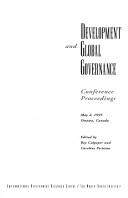| Listing 1 - 10 of 10 |
Sort by
|
Book
ISBN: 1896770258 Year: 1999 Publisher: Ottawa, Ont.
Abstract | Keywords | Export | Availability | Bookmark
 Loading...
Loading...Choose an application
- Reference Manager
- EndNote
- RefWorks (Direct export to RefWorks)
Book
ISBN: 092049479X Year: 1988 Publisher: Ottawa, Ont.
Abstract | Keywords | Export | Availability | Bookmark
 Loading...
Loading...Choose an application
- Reference Manager
- EndNote
- RefWorks (Direct export to RefWorks)
Periodical
ISSN: 11884347 Publisher: Ottawa, Ont.
Abstract | Keywords | Export | Availability | Bookmark
 Loading...
Loading...Choose an application
- Reference Manager
- EndNote
- RefWorks (Direct export to RefWorks)
Periodical
ISSN: 12062308 Year: 1997 Publisher: Ottawa, Ont.
Abstract | Keywords | Export | Availability | Bookmark
 Loading...
Loading...Choose an application
- Reference Manager
- EndNote
- RefWorks (Direct export to RefWorks)
Book
ISBN: 0773585745 9780773585744 9780773539358 0773539352 9780773539365 0773539360 Year: 2011 Publisher: Montréal [Que.] McGill-Queen's University Press
Abstract | Keywords | Export | Availability | Bookmark
 Loading...
Loading...Choose an application
- Reference Manager
- EndNote
- RefWorks (Direct export to RefWorks)
Shows how flawed elections can act as democracy in reverse and diminish political legitimacy and stable governance. By looking at various forms of political turmoil, the book provides valuable lessons and practical advice on how to better mitigate conflict and violence before, during, and after highly charged elections.
Elections. --- Political violence. --- Conflict management. --- Democracy. --- Self-government --- Political science --- Equality --- Representative government and representation --- Republics --- Conflict control --- Conflict resolution --- Dispute settlement --- Management of conflict --- Managing conflict --- Management --- Negotiation --- Problem solving --- Social conflict --- Crisis management --- Violence --- Political crimes and offenses --- Terrorism --- Electoral politics --- Franchise --- Polls --- Politics, Practical --- Plebiscite --- Political campaigns

ISBN: 1282232827 9786613810564 0889206759 0585339325 9780585339320 0889203040 9780889203044 9780889206755 Year: 1998 Publisher: Waterloo, Ont. Wilfrid Laurier University Press in association with the North-South Institute
Abstract | Keywords | Export | Availability | Bookmark
 Loading...
Loading...Choose an application
- Reference Manager
- EndNote
- RefWorks (Direct export to RefWorks)
"Aid and Ebb Tide: A History of CIDA and Canadian Development Assistance examines Canada's mixed record since 1950 in transferring over $50 billion in capital and expertise to developing countries through ODA. It focuses in particular on the Canadian International Development Agency (CIDA), the organization chiefly responsible for delivering Canada's development assistance. Aid and Ebb Tide calls for a renewed and reformed Canadian commitment to development cooperation at a time when the gap between the world's richest and poorest has been widening alarmingly and millions are still being born into poverty and human insecurity."--pub. desc.
Economic assistance, Canadian --- Canadian economic assistance --- History. --- Canadian International Development Agency --- Canada. --- A.C.D.I. --- ACDI --- Agence canadienne de développement international --- Agencia Canadense para o Desenvolvimento Internacional --- Agencia Canadiense de Desarrollo Internacional --- Agencia Canadiense para el Desarrollo Internacional --- C.I.D.A. --- CIDA --- Kanadsʹka ahent︠s︡ii︠a︡ miz︠h︡narodnoho rozvytku --- Kanadskoe agentstvo po mezhdunarodnomu razvitii︠u︡ --- ʻOngkān Bō̜rihān Withētsakit hǣng Prathēt Khāenādā --- ʻOngkān Bō̜rihān Withētsakit hǣng Prathēt Khānādā --- Wakālah al-Kanadīyah al-Dawlīyah lil-Tanmiyah --- Badan Kerjasama Pembangunan Internasional Kanada --- 加拿大国际发展署 --- Jianada guo ji fa zhan shu --- ʻOngkān Bō̜rihān Withētsakit hǣng Prathēt Khāenādā --- ʻOngkān Bō̜rihān Withētsakit hǣng Prathēt Khānādā
Book
ISBN: 1282864424 9786612864421 0773574492 9780773574496 9781282864429 9780773532823 077353282X 9780773532816 0773532811 0773578587 Year: 2007 Publisher: Montreal [Que.] Published for the McGill Institute for Health and Social Policy and the North-South Institute-L'Institut nord-sud by McGill-Queen's University Press
Abstract | Keywords | Export | Availability | Bookmark
 Loading...
Loading...Choose an application
- Reference Manager
- EndNote
- RefWorks (Direct export to RefWorks)
Seeking improved health and increased income have long been common goals. Those who make the case that free trade will help everyone argue that the growth from increased trade will be shared and will improve people's lives. But they have not answered the fundamental question of how to formulate trade policy to simultaneously achieve growth and benefit health. Trade and Health answers this question by exploring the entire array of avenues through which trade affects health, and examining a number of case studies on how best to achieve policies that integrate health objectives. The contributors represent the full range of stakeholders in the trade-health debate - medical professionals, civil society representatives, academics from a range of disciplines, and negotiators and policy-makers at the national and global levels. Contributors include Bijit Bora (WTO), Rupa Chanda (IIMB), Diana Chigas (Tufts), Carlos Correa (U of Buenos Aires), Eric Dagenais (Industry Canada), Alison Earle (Harvard), David P. Fidler (Indiana), Anabel González (WTO), Ronald Labonte (Ottawa), Cha-aim Pachnee (MOPH-Thailand), Pedro Roffe (UNCTAD-ICTSD), Nancy Ross (McGill), David Sanders (Western Cape), Ted Schrecker (Ottawa), Anna Shea (McGill), Elisabeth Tuerk (UNCTAD), David Vivas-Eugui (ICTSD), Johanna von Braun (ICTSD), and Suwit Wibulpolprasert (MOPH-Thailand).
Medical economics. --- Medical policy --- International trade. --- External trade --- Foreign commerce --- Foreign trade --- Global commerce --- Global trade --- Trade, International --- World trade --- Commerce --- International economic relations --- Non-traded goods --- Health care policy --- Health policy --- Medical care --- Medicine and state --- Policy, Medical --- Public health --- Public health policy --- State and medicine --- Science and state --- Social policy --- Economics, Medical --- Health --- Health economics --- Hygiene --- Medicine --- International cooperation. --- Government policy --- Economic aspects --- Medical economics --- International trade --- International Cooperation --- Health Resources --- Health Policy --- Treaties --- Foreign Aid --- Aid, Foreign --- Cooperation, International --- Treaty --- Commercial Sector --- Prices --- Sales --- Vendors --- Business --- Businesses --- Commerces --- Commercial Sectors --- Price --- Sale --- Sector, Commercial --- Sectors, Commercial --- Vendor --- Industry --- Ethics, Business --- Medical Economics --- International cooperation --- economics --- E-books

ISBN: 0889368058 1552501361 9781552501368 0921942974 9780921942979 9780889368057 1280717688 9781280717680 9786610717682 6610717680 Year: 1996 Publisher: Ottawa, Ont. : International Development Research Centre ; North-South Institute,
Abstract | Keywords | Export | Availability | Bookmark
 Loading...
Loading...Choose an application
- Reference Manager
- EndNote
- RefWorks (Direct export to RefWorks)
Fifty years on, the reform of the Bretton Woods institutions — the World Bank and the International Monetary Fund — has become a lively issue. The G-7 industrialized countries took a first bite at this subject during their Halifax Summit, and the debate continues. A group of experts from all continents met in Ottawa to give challenging advice to the summiteers and beyond, ranging from the view that the G-7 itself is in eclipse to an argument for turning the IMF into a central world bank. This book contains the seven papers and a summary of the discussion from that meeting, sponsored jointly by
International finance --- Development aid. Development cooperation --- Developing countries --- Financial institutions, International --- Economic assistance --- International financial institutions --- International Monetary Fund --- World Bank --- Internationaal monetair fonds --- International monetary fund --- Világbank --- Banque internationale pour la reconstruction et le développement --- Mezhdunarodnyĭ bank dli︠a︡ rekonstrukt︠s︡ii i razvitii︠a︡ --- MBRR --- Sekai Ginkō --- Kokusai Fukkō Kaihatsu Ginkō --- Kukche Puhŭng Kaebal Ŭnhaeng --- Segye Ŭnhaeng --- IBRD --- Welt Bank --- Weltbank --- Banque mondiale --- Internationale Bank für Wiederaufbau und Entwicklung --- Banco Internacional de Reconstrucción y Fomento --- Banco Mundial --- B.I.R.D. --- BIRD --- Banca Internațională pentru Reconstrucție și Dezvoltare --- Mirovoĭ Bank --- Svitovyĭ Bank --- Svitovyĭ bank rekonstrukt︠s︡iï i rozvytku --- Verdensbanken --- Międzynarodowy Bank Rozwoju i Odbudowy --- Bank al-Dawlī lil-Inshāʼ wa-al-Taʻmīr --- Bank al-Dawlī --- Världsbanken --- Banca ricostruzione e sviluppo --- Banca di ricostruzione e sviluppo --- BIRF --- I.B.R.D. --- B.I.R.F. --- Shih chieh yin hang --- Shi jie yin hang --- International Bank for Reconstruction and Development --- World Bank Group. World Bank --- Thanākhān Lōk --- Bank Światowy --- Viśva Baiṅka --- Lōka Băṅkuva --- Ngân hàng Thế giới --- Vsemirnyĭ Bank --- Bank Dunia --- Msopʻlio Bankis --- Banca Mondială --- BM --- Prapañca Byāṅku --- Banca mondiale --- Banca internazionale per la ricostruzione e lo sviluppo --- Dhanāgār Bibhab Lok --- البنك الدولي --- بنك الدولي --- 世界銀行 --- 世界银行 --- 国際復興開発銀行 --- Dėlkhiĭn Bank --- Дэлхийн Банк --- Hamashkharhayin Banki --- Svetska Banka --- Wereldbank --- Internationale bank voor herstel en ontwikkeling
Book
ISBN: 1896770673 1552501531 9786610717767 1280717769 1417569301 9781417569304 9781552501535 6610717761 9781280717765 Year: 2004 Publisher: Ottawa North-South Institute :International Development Research Centre
Abstract | Keywords | Export | Availability | Bookmark
 Loading...
Loading...Choose an application
- Reference Manager
- EndNote
- RefWorks (Direct export to RefWorks)
Is Latin America moving toward a new generation of pro-poor land reforms? What are the real openings and constraints with regard to such policies at the local, national, and international levels? What role is research playing, and what role might it play, in tracking efforts and revealing policy options? This book suggests that Latin America may not be poised for a radical shift in land policy and administration, and that it is home to some worrisome trends and a rich array of initiatives on land issues. Researchers have a crucial role to play in illuminating policy alternatives and monitoring outcomes.
Land. Real estate --- Economic policy and planning (general) --- Economic geography --- Latin America --- Land reform --- Land tenure --- Agrarian tenure --- Feudal tenure --- Freehold --- Land ownership --- Land question --- Landownership --- Tenure of land --- Land use, Rural --- Real property --- Land, Nationalization of --- Landowners --- Serfdom --- Agrarian reform --- Economic policy --- Social policy --- Agriculture and state --- Government policy --- Economic conditions
Book
ISBN: 1281974382 9786611974381 155250154X 9781552501542 1896770681 9781896770680 Year: 2004 Publisher: Ottawa North-South Institute/L'Institut Nord-Sud :Centro Internacional de Investigaciones para el Desarrollo
Abstract | Keywords | Export | Availability | Bookmark
 Loading...
Loading...Choose an application
- Reference Manager
- EndNote
- RefWorks (Direct export to RefWorks)
Land reform --- Land tenure --- Agrarian tenure --- Feudal tenure --- Freehold --- Land ownership --- Land question --- Landownership --- Tenure of land --- Land use, Rural --- Real property --- Land, Nationalization of --- Landowners --- Serfdom --- Agrarian reform --- Economic policy --- Social policy --- Agriculture and state --- Government policy --- Latin America --- Economic conditions
| Listing 1 - 10 of 10 |
Sort by
|

 Search
Search Feedback
Feedback About UniCat
About UniCat  Help
Help News
News